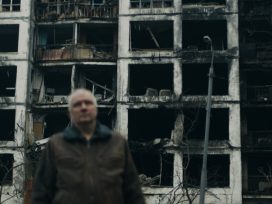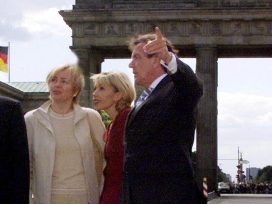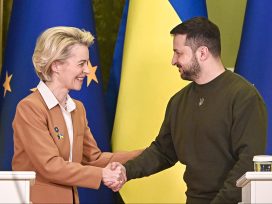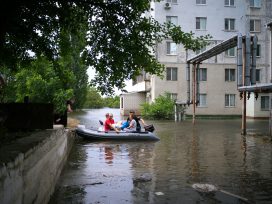An agreement brokered between Ukraine, Russia, Turkey and the UN permits cargo ships to transport grain from Black Sea ports again. But assurance of mine-free safe passage is a way off. And behind the negotiations are manoeuvres that reflect long-term political, economic and societal implications.
Political scientist, political economist, and writer Francis Fukuyama spoke with Valerii Pekar, author, lecturer, and president and co-owner of Euroindex on 3 June 2022 for PEN Ukraine’s series #DialoguesOnWar. This is a transcription of key moments from their discussion. You can check out the recorded conversation here.
Francis Fukuyama: Valerii, could you tell us about the general situation and perceptions from the Ukrainian side about how the war is going, and then focus on some economic consequences and how you see Ukraine’s future?
Valerii Pekar: From a purely military point of view, we are now in the third stage of the war. The first stage was a rapid manoeuvre war aimed at capturing Ukrainian cities and forcing the Ukrainian government to surrender. It failed; it was impossible. Then Russian forces entered the second stage, which was a scorched-earth strategy already used in Syria and Chechnya, to make as much damage as possible to Ukrainian civilians and Ukrainian civilian infrastructure to convince the leadership to surrender. This strategy also failed.
And now the third phase of the war is taking place. It is a purely positional war, much more similar to World War II. Russian forces have no resources to wage this war on the long frontline; they are concentrated on one territory in Eastern Ukraine and they are trying to defeat the Ukrainian army there.
We are now at an extremely interesting point in this war where it is still possible for Ukraine to win. But Russia has already lost. Indeed, the end of the war, which will become a total loss for everyone, is still possible, for instance, if the Russian leadership uses nuclear weapons. But there is no scenario in which Russia wins. It has already lost and everyone should accept this fact. Now we need to end this war with a victory for Ukraine, which will guarantee European and global security.
From an economic point of view, we’re in huge decline. Practically half of the Ukrainian economy has come to a standstill. Now we are seeing a certain revival in the territories that are free, like Kyiv and its surrounding areas. Small and medium-sized businesses are more flexible. They are trying to relaunch or relocate to Western Ukraine. However, the whole country is under missile attacks, and some 20% of Ukrainian territory is still occupied by Russian forces.
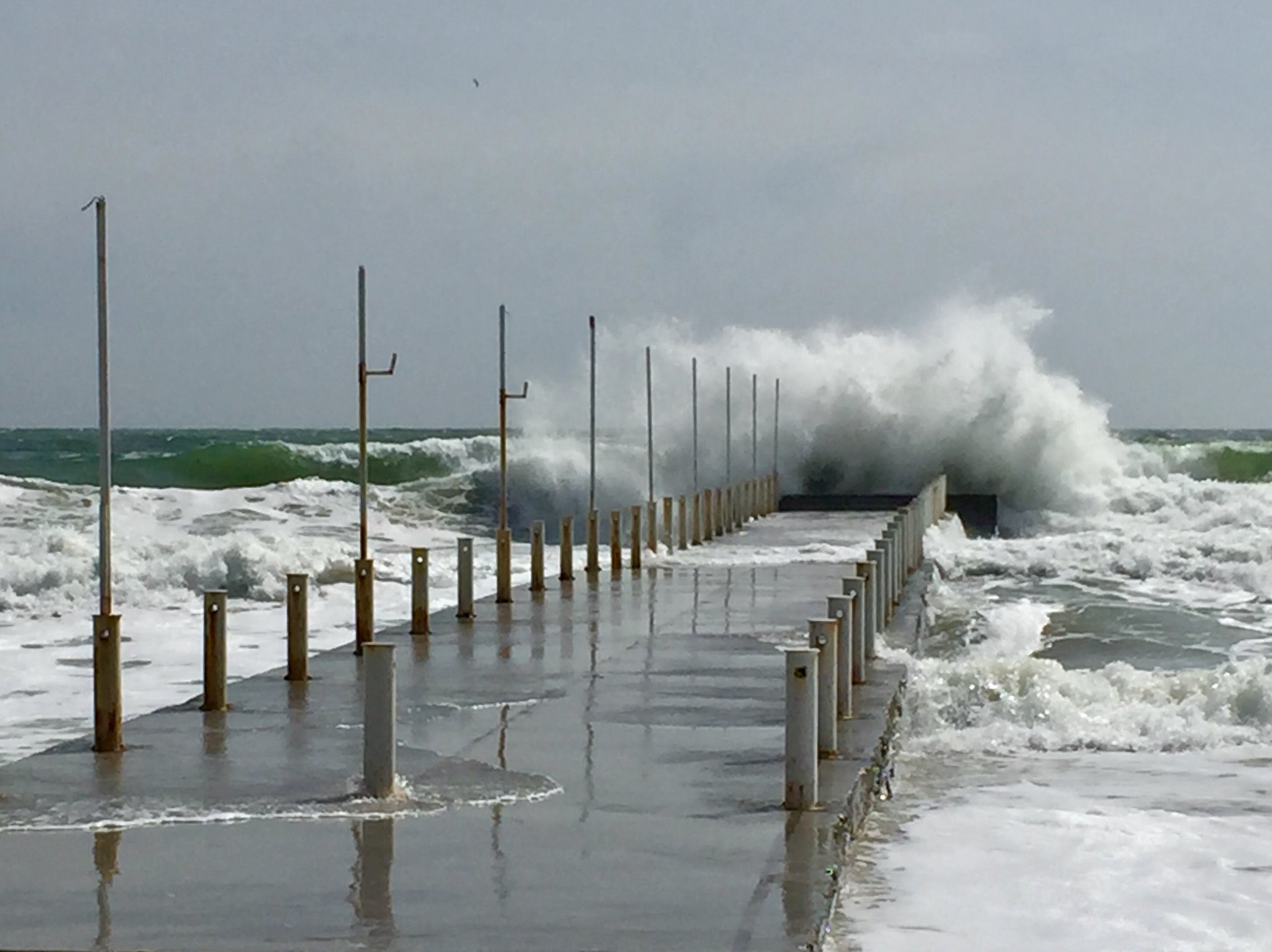
Black Sea, Odesa, Ukraine. Image by Julia via Flickr
Francis Fukuyama: So, maybe, you could say something about the situation in the Black Sea? That’s an area that has been getting more attention. As everyone knows, Ukraine is a major agricultural exporter. A whole year’s worth of grain is just sitting in silos because of the Russian blockade of Ukraine’s Black Sea coast. There’s been increasing attention paid to this. A delegation of African leaders went to talk to Putin about opening up some of those ports. Because, in addition to cutting off a major source of export earnings for Ukraine, this is causing a major food crisis in the Middle East, Sub-Saharan Africa, and many other parts of the world. What is the situation there and do you see any prospects for progress?
Valerii Pekar: Indeed, sea blockade is one of Putin’s major weapons because two major sectors of Ukrainian export – agriculture and metallurgy – are transported by sea. There will be no world metal crisis, but there surely is the threat of a food crisis. Surprisingly, some countries which could be affected by it are still voting for Russia in various UN arenas. This is a threat not only to the Middle East but to Europe as well. A food crisis in the Middle East and Africa will create another refugee crisis in Europe and will undermine European unity and European strength. This is a problem on a global scale. What are the options? Several things can be done in this case. Ukraine cannot remove this blockade by itself because it has a rather small fleet. To provide food to the countries in need, we need an international coalition. Who can do this? Any responsible leader, either the EU or China, or it could be a Turkish initiative.
Francis Fukuyama: I think that this is a really complicated diplomatic effort. You could imagine a UN effort to open up the Black Sea because of the food crisis. You are talking about protecting the innocent passage of commercial ships in international waters because once you get outside of Ukrainian territorial waters, these are international waters. It seems to me that Turkey should have an interest in being seen as a leader in trying to resolve this food crisis, not necessarily because it could side with Ukraine or Russia in the war, but simply because this is a global interest that could be served by it.
I think that the United States at some point had some worries about escalation if NATO were seen as trying to break this blockade. I think this is an overstated fear. In general, although we do have to worry about Russian escalation, especially toward the use of nuclear weapons, by and large, it is not very likely to happen. If the Russians were to escalate, for example, by trying to sink commercial shipping coming out of Ukraine or attacking boats escorting this kind of shipping, it would look very bad for them politically.
I guess the one thing that I worry about is whether the narrative might change. At this point, people tend to blame Russia for the food crisis more than Ukraine. But if the war bogs down in their increasing calls for a negotiated settlement, that narrative may change and people will start blaming Ukraine, saying ‘they need to settle, they need to make territorial concessions’ to end the war and open up the possibility of exporting food. It’s very important to control the narrative to make sure that the blame for this crisis lies on the party that really is responsible.
Valerii Pekar: Indeed, it is not purely NATO’s job to remove the blockade. I understand NATO leaders who are afraid of escalation from the Russian side. We also should not forget about another huge problem for the international community which is the demining of the Black Sea. The room for responsible leadership to resolve these issues exists for every country, not only for NATO members.
Addressing your question about nuclear weapons, there are two opposite views in the West and in Ukraine concerning the possibility of a nuclear attack. Many Western observers think that Putin will use nuclear weapons when he feels weak, like a cornered rat, as an ultimate weapon. This is not true. We in Ukraine believe in the opposite scenario. We know Russia and the Russian leadership quite well, so we understand that Putin will use nuclear weapons from the point of strength, not weakness. If he feels strong enough, if he feels there will be no response apart from diplomatic talks, if he feels that the surrounding Russian elite supports him and is consolidated around him, then he will do it.
Also I would like to comment on the narrative of ‘saving face’. Putin controls all the media in his country. People there are used to blindly believing Russian propaganda. When George Orwell wrote his dystopia, he did not expect that someone would take his book and use it as a manual. You are right in saying that we should control the narrative.
Francis Fukuyama: I agree with you on escalation fears. I don’t think that anyone should not worry about the escalation. This conflict is different from all prior post-Cold War conflicts in that it involves a country that has a very large nuclear arsenal. I don’t think we should simply discount that. But I do think that if you look at the operational consequences of the Russians actually using a nuclear weapon, it wouldn’t buy them that much military advantage and would almost certainly trigger a NATO response. NATO does not have to reply symmetrically. If Russians use a tactical nuclear weapon, NATO does not have to also use a tactical nuclear weapon; there are many conventional responses. For example, NATO has been reluctant to impose a no-fly zone over Ukraine precisely for fear of this kind of escalation. But if it happens, then a no-fly zone with direct NATO involvement, attacking Russian aircrafts and air defence systems, is on the table.
And I think, as the Russians make these calculations, they see that they do not buy themselves any advantage by moving to this kind of escalation. Furthermore, we have not seen any intelligence information about the Russians preparing to use nuclear weapons. They would have to get ready in a lot of different ways and they simply have not moved in that direction.
I must say, if you watch Moscow television, they have been completely irresponsible in very casually talking about nuclear attacks on Europe, hitting Berlin and Paris with nuclear weapons as if this is something that is a real option for any responsible leader. I don’t know why they think it is advantageous to tell their people that they have this kind of option, but it is highly irresponsible.
Valerii Pekar: Yes. And I am afraid of what we can call ‘Ukraine fatigue’. It looks like the war is not on the front pages of newspapers and not on major news programs anymore elsewhere.
In international politics, we see tectonic changes happening in weeks which we believed would take decades to happen. I am talking about changes to German policy, or the fantastic unity of NATO and the EU. The world has changed dramatically.
Now we should think about the future, about the lessons this war has taught us. For example, what changes need to be made in the world, particularly in the military policies of different nations and international organizations, to ensure global security. In your opinion, what are the lessons the international community should learn?
Francis Fukuyama: Well, I have just written a new book called Liberalism and its Discontents which is an effort to explain what liberalism is and why it remains the most important ideology or political structure that needs to be defended. Liberalism is a doctrine that says that all human beings are basically morally equal and that they have rights: rights to speech, to belief, to association. That they should be free to make decisions in their lives, but this should be protected by the rule of law in which the powers of governments are limited. This is really what is at stake in this war.
In 2019, Putin gave a very famous interview to the Financial Times, in which he said that liberalism is an obsolete doctrine. And in this he has been supported by many populist leaders around the world, people like Marine Le Pen or Eric Zemmour in France, Victor Orban in Hungary, and Donald Trump in the US, who has never been able to say a negative thing about him. I think this is the largest stake that we are fighting over. I think in some respects it has been a good thing that people can see what the alternative to liberalism is – Putin is the alternative.
I think the outcome of this war in Ukraine is going to have a major impact on the rest of the world one way or another. If Putin succeeds in grabbing a major part of Ukraine and holding on to it, he’s going to be able to say ‘forget about the earlier objectives of overthrowing the regime altogether, we’ve managed to secure Donbas and we’re able to choke Ukraine economically’, and he’ll be able to portray that as a kind of victory and that will vindicate a lot of populists that supported him, despite all of the genuine genocide and human rights violations and deporting of populations that have occurred under Putin’s occupation. I am afraid that those populists will regain some traction. So, that’s why I think that the war has a much larger implication for the global liberal order. That’s why other liberal democracies around the world must continue to give Ukraine the maximum amount of support that they can.
#DialoguesOnWar is a series of conversations between leading thinkers hosted by PEN Ukraine.
Published 25 July 2022
Original in English
First published by Eurozine (as transcript)
Contributed by PEN Ukraine © Valerii Pekar / Francis Fukuyama / PEN Ukraine / Eurozine
PDF/PRINTIn collaboration with
In focal points
Newsletter
Subscribe to know what’s worth thinking about.
Related Articles

Growing numbers of Russians are fleeing the stifling atmosphere that has settled across the country’s political and cultural realms. Nowhere is this more tangible than in the world of popular music – once a shared cultural space between the two nations, now just another battleground in Russia’s war against Ukraine.

On top of housing, work and schooling, Ukrainian refugees with HIV face an additional, urgent difficulty: how to access the antiretroviral medicines they need to suppress the virus. In Poland, they face a particular stigma, causing many HIV positive refugees to conceal their health status.

